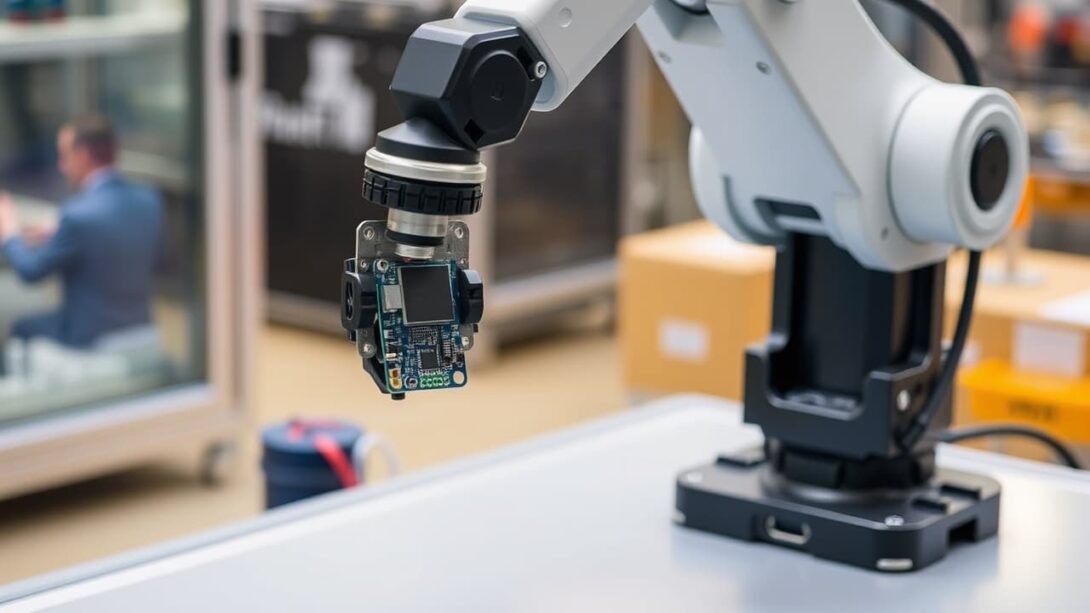The landscape of the job market is undergoing a seismic shift as we approach 2025, driven by the rapid advancements in technology. Artificial intelligence (AI) and machine learning are at the forefront of this transformation, reshaping traditional roles and creating a plethora of new job opportunities. As we delve into the key trends that will define the future of work, it becomes imperative for professionals to stay ahead of the curve and adapt to the evolving demands of their sectors.
The Impact of AI on the Job Market

AI has become a cornerstone of modern business operations, fundamentally altering job roles across industries. The integration of AI technologies allows for enhanced productivity and innovation, creating a demand for professionals who can navigate this new landscape. Skills such as understanding AI-augmented capabilities, ethical considerations, and emotional intelligence are increasingly vital. The World Economic Forum emphasizes that by 2027, analytical and creative thinking skills alongside AI and big data proficiency will dominate the job market. As companies adapt to AI, they seek workers who can collaborate effectively with these technologies, shifting the focus to more complex problem-solving and creative tasks.
Understanding AI’s Role in Reshaping Careers
The rise of AI systems is not just automating processes; it is also reshaping entire career paths. Professionals must now equip themselves with new skills to thrive in an AI-driven economy. Understanding the nuances of generative AI and machine learning is essential for those looking to excel in the tech industry. The pandemic has accelerated the adoption of remote work, making it crucial for individuals to adapt to virtual environments and leverage cloud computing solutions. As the labor market evolves, those who embrace continuous learning and participate in training programs geared towards AI and machine learning will find themselves poised for success in the future job market.
In-Demand Tech Jobs Driven by AI Innovations
The rise of AI is generating a plethora of job opportunities, particularly in fields like machine learning and AI engineering. As organizations across sectors increasingly rely on AI for decision-making and automation, the demand for skilled professionals in AI and machine learning is soaring. According to the Future of Jobs 2023 report, roles such as AI/ML Engineers and Automation Consultants are expected to be at the forefront of this shift. The tech industry is also seeing a heightened need for UX Designers and Data Scientists, who can harness AI to improve user experiences and data-driven insights, respectively. In this evolving digital landscape, tools like VPN Unlimited are becoming essential for ensuring secure and private access to remote work environments, further emphasizing the importance of cybersecurity skills.
Challenges and Opportunities in the AI Job Market
While the AI job market presents numerous opportunities, it also comes with challenges. One significant barrier to entry is the lack of skilled professionals who can effectively implement AI solutions. Organizations face difficulties in estimating the business value of AI projects, which can hinder adoption. Additionally, as automation takes over repetitive tasks, workers must adapt to new roles that require higher levels of creativity and problem-solving. Upskilling and continuous learning will be critical for professionals looking to thrive in an AI-driven economy.
Emerging Technologies Shaping the Future of Work

The Rise of Generative AI and Its Applications
Generative AI is revolutionizing the job market by enabling machines to autonomously create content, designs, and even code, fostering innovation and efficiency across various sectors. The technology’s adoption has surged, with organizations increasingly recognizing its potential to streamline workflows and enhance productivity. Industries such as marketing and software development are leveraging generative AI to generate tailored content and automate creative processes, which is reshaping traditional career paths. As a result, professionals are expected to develop new skills that align with these advancements, leading to an influx of job opportunities in both content creation and software engineering. The World Economic Forum projects that companies will continue to invest in generative AI, thus poising the job market for significant transformations by 2025.
How Robotics is Transforming Industries
Robotics engineering stands at the forefront of technological advancements, expanding beyond traditional manufacturing into diverse sectors such as healthcare, logistics, and agriculture. As businesses increasingly adopt robotics to automate mundane tasks, the demand for skilled robotics engineers is surging, allowing human workers to focus on more complex problem-solving challenges. The integration of robots into everyday operations necessitates a workforce adept in mechanical design, programming, and systems thinking. This shift highlights the urgent need for innovative thinkers capable of designing and programming robotic systems. As the landscape evolves, job seekers must stay ahead of the curve by participating in training programs that enhance their skills in robotics, ensuring they are well-prepared for the future job market.
The Influence of Machine Learning on Job Roles
Machine learning is fundamentally transforming data analysis and utilization across various industries, leading to significant job growth in this field. Professionals tasked with developing algorithms that enable machines to learn from data are increasingly in-demand as companies seek data-driven insights to inform their decision-making processes. The rise of machine learning necessitates a robust understanding of AI and big data, as highlighted by the World Economic Forum, which emphasizes the importance of these skills for future job seekers. To thrive in this evolving landscape, individuals must embrace continuous learning and adapt to new technologies that shape the future of work, ensuring they remain competitive and equipped for the jobs of the future.
Automation and Its Effects on the Labor Market
Identifying Jobs at Risk of Automation
The rise of automation is reshaping the labor market, posing significant risks to jobs that involve repetitive and rule-based tasks. Positions such as data entry clerks, assembly line workers, and telemarketers are particularly vulnerable to displacement as companies increasingly adopt robotics and automation technologies. Research indicates that many jobs within sectors like manufacturing and retail may be automated within the next decade, leading to a potential loss of millions of jobs. Identifying these at-risk roles is crucial for workers, as it enables them to pivot towards emerging opportunities in tech and data analysis, thus ensuring their relevance in the future job market.
New Career Paths Created by Automation
Despite the risks posed by automation, it simultaneously creates new career paths that are expanding rapidly as a result of technological advancements. Fields such as robotics engineering, AI development, and data analysis are witnessing a surge in demand for skilled professionals. As organizations seek individuals capable of designing, implementing, and maintaining automated systems, roles focused on overseeing these processes, such as automation consultants and AI trainers, are becoming increasingly important. This shift underscores the need for continuous learning and adaptability among professionals, as they must acquire new skills to thrive in an evolving tech industry driven by automation.
Strategies for Workers to Adapt to Automation
To successfully navigate the challenges presented by an automated job market, workers must adopt proactive strategies for adaptation. Engaging in upskilling through online courses and training programs is essential to acquire competencies relevant to emerging technologies. Networking within tech communities can provide valuable insights and opportunities for career growth. Moreover, developing soft skills such as creativity, critical thinking, and emotional intelligence is increasingly vital in an automated environment, as these attributes are highly valued by employers. Organizations play a crucial role in this transition by offering training programs and resources that empower employees to adapt and succeed in the changing landscape of work.
Tech Trends Driving Productivity in 2025
Utilizing the Internet of Things for Enhanced Efficiency
The Internet of Things (IoT) is revolutionizing the way businesses operate by intertwining various devices, enabling seamless data exchange, and enhancing productivity. This technological advancement allows industries such as manufacturing, logistics, and healthcare to optimize their workflows and achieve operational efficiency. Real-time monitoring of processes facilitated by IoT solutions not only reduces operational costs but also enhances decision-making capabilities. As the number of interconnected devices continues to rise, so does the demand for IoT specialists who can manage and analyze the vast amounts of data generated. Professionals who possess proficiency in IoT technologies will be essential in driving productivity in 2025, allowing organizations to stay ahead of the curve in an increasingly competitive landscape.
The Role of Virtual Reality in Professional Training
Virtual reality (VR) is carving out a significant niche in professional training, offering immersive experiences that significantly enhance learning outcomes. Various industries, including healthcare, aviation, and manufacturing, are now leveraging VR simulations to train employees in high-stakes environments without the associated risks. These immersive training scenarios not only accelerate skill acquisition but also foster an engaging learning experience that traditional methods may lack. As VR technology becomes more integrated into training programs, the demand for professionals skilled in VR development and instructional design is set to increase. Organizations that recognize the potential of VR in workforce development will be better positioned to equip their employees with the necessary skills for the jobs of the future.
Sustainable Technology: Balancing Growth and Responsibility
As businesses navigate the complexities of growth and environmental responsibility, sustainable technology is emerging as a key priority. Companies are investing heavily in green technologies, such as renewable energy and energy-efficient systems, to minimize their carbon footprint while maximizing productivity. This shift is not only essential for meeting regulatory requirements but also aligns with consumer expectations for sustainability. As a result, new job opportunities are arising in areas like environmental engineering, sustainability consulting, and renewable energy management. Professionals with expertise in sustainable practices will be highly sought after, making it imperative for individuals to embrace these advancements and adapt to the evolving job market shaped by responsible technological practices.
Industry Trends and Investments for Future Tech Jobs
Analyzing the World Economic Forum’s Predictions
The World Economic Forum’s Future of Jobs 2023 report sheds light on the evolving job landscape, emphasizing the growing importance of AI, big data, and the necessity for continuous upskilling and lifelong learning. Key insights from the report reveal that by 2027, skills such as analytical thinking, creativity, and proficiency in AI and machine learning will be among the most sought-after attributes in the job market. Organizations must adapt to these shifts by investing in employee development to remain competitive in a rapidly changing environment. As the job market continues to evolve, the trends highlighted by the World Economic Forum will play a pivotal role in shaping the future of work.
New Investments in Tech: What to Expect
Investment in technology is poised to surge as companies strive to innovate and maintain a competitive edge. Key areas such as artificial intelligence, cybersecurity, and cloud computing are attracting significant funding as businesses recognize their potential to drive productivity and growth. According to the Future of Jobs report, organizations are increasingly prioritizing investments in skills development and technology adoption to enhance their operational capabilities. This trend is likely to foster a robust job market for tech professionals equipped with the latest skills and knowledge, ultimately reshaping the future job market and creating numerous job opportunities in the tech industry.
Preparing for New Roles in the Changing Job Market
As the job market evolves, workers must proactively prepare for new roles that emerge from ongoing technological advancements. Continuous learning and upskilling are crucial for remaining relevant in this dynamic environment. Professionals should focus on acquiring skills in high-demand areas such as AI, data analysis, and cybersecurity, ensuring they remain competitive in the ever-changing landscape. Engaging with industry communities and networking can provide valuable insights into emerging trends and opportunities. Additionally, organizations must foster a culture of adaptability and learning to support their workforce in navigating the challenges and opportunities presented by the future of work.
